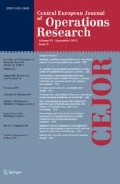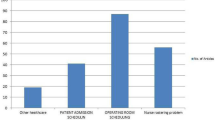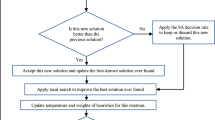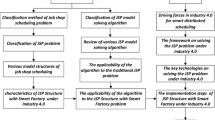Abstract
Human resources have played an important role in the production systems of manufacturing enterprises. At the same time, human resource allocation, as a scheduling problem, has attracted more and more attention from the industry and academia, with the increasing complexity of technology and the rising cost of workforce. However, the existing scheduling methods fail to fully consider the relationship between tasks and employees. In this paper we consider a single workgroup scheduling problem with the assumption of human resources variability. Jobs must be assigned to employees, where the number of processing personnel and the processing time are variable for one job. We model the problem as a combinatorial optimization problem and the objective considered is to minimize the maximum finish time which is called makespan. This problem is transformed into a two-dimension rectangle strip packing problem and we propose a hybrid optimization algorithm which combines scheduling algorithm with packing algorithm. Finally, different size cases are adopted to test the model. Results show the proposed strategy and algorithm are suitable for solving single workgroup scheduling very well.






Similar content being viewed by others
References
Alves C, de Carvalho JV, Clautiaux F, Rietz J (2014) Multi dimensional dual-feasible functions and fast lower bounds for the vector packing problem. Eur J Oper Res 233:43–63
Billaut J-C, Della Croce F, Grosso A (2015) A single machine scheduling problem with two-dimensional vector packing constraints. Eur J Oper Res 243(1):75–81
Burke EK, Kendall G, Whitwell G (2004) A new placement heuristic for the orthogonal stock-cutting problem. Oper Res 52(4):655–671. https://doi.org/10.1287/opre.1040.0109
Dahmani N, Clautiaux François, Krichen S, Talbi EG (2013) Iterative approaches for solving a multi-objective 2-dimensional vector packing problem. Comput Ind Eng 66(1):158–170
De Carvalho JMV (2002) Lp models for bin packing and cutting stock problems. Eur J Oper Res 141(2):253–273
Dósa György, Fügenschuh Armin, Tan Z et al (2018) Tight upper bounds for semi-online scheduling on two uniform machines with known optimum. Cent Eur J Oper Res 26(1):161–180
Fanjul-Peyro L, Perea F, Ruiz Rubén (2017) Models and matheuristics for the unrelated parallel machine scheduling problem with additional resources. Eur J Oper Res 260(2):482–493
Hifi M (1998) Exact algorithms for the guillotine strip cutting/packing problem. Comput Oper Res 25(11):925–940
Horváth Markó, Kis Tamás (2019) Computing strong lower and upper bounds for the integrated multiple- depot vehicle and crew scheduling problem with branch-and-price. Cent Eur J Oper Res 27(1):39–67
Hu Q, Lim A, Zhu W (2015) The two-dimensional vector packing problem with piecewise linear cost function. Omega 50:43–53
Kartak VM, Ripatti AV (2018) The minimum raster set problem and its application to the d -dimensional orthogonal packing problem. Eur J Oper Res 271(1):33–39
Kim HJ (2018) Bounds for parallel machine scheduling with predefined parts of jobs and setup time. Ann Oper Res 261(1–2):401–412
Lawler EL (1977) A “Pseudopolynomial” algorithm for sequencing jobs to minimize total tardiness. Ann Discret Math 1:331–342. https://doi.org/10.1016/S0167-5060(08)70742-8
Lesh N, Marks J, McMahon A, Mitzenmacher M (2004) Exhaustive approaches to 2D rectanglar perfect packings. Inform Process Lett 90:7–14
Manne AS (1960) On the job-shop scheduling problem. Oper Res 8:219–223
Marinelli F, Pizzuti A (2018) A sequential value correction heuristic for a bi-objective two-dimensional bin-packing. Electron Notes Discret Math 64:25–34
Martello S, Monaci M, Vigo D (2003) An exact approach to the strip-packing problem. Informs J Comput 15(3):310–319. https://doi.org/10.1287/ijoc.15.3.310.16082
Peng BT, Zhou YW (2012) Recursive heuristic algorithm for the 2D rectangular strip packing problem. J Softw 23(10):2600–2611 (in Chinese)
Polyakovskiy S, M’Hallah Rym (2018) A hybrid feasibility constraints-guided search to the two-dimensional bin packing problem with due dates. Eur J Oper Res 266(3):818–839
Rajkanth R, Rajendran C, Ziegler H (2017) Heuristics to minimize the completion time variance of jobs on a single machine and on identical parallel machines. Int J Adv Manuf Technol 88(5–8):1923–1936
Tapia JFD, Lee J-Y, Ooi REH, Foo DCY, Tan RR (2016) Planning and scheduling of CO 2 capture, utilization and storage (CCUS) operations as a strip packing problem. Process Saf Environ 104:358–372. https://doi.org/10.1016/j.psep.2016.09.013
Van Hulle MM (1991) A goal programming network for mixed integer linear programming: a case study for the job-shop scheduling problem. Int J Neural Syst 2(3):201–209
Walter R (2017) A note on minimizing the sum of squares of machine completion times on two identical parallel machines. Cent Eur J Oper Res 25(1):139–144
Zhang D, Shi L, Leung SCH, Wu T (2016) A priority heuristic for the guillotine rectangular packing problem. Inform Process Lett 116(1):15–21
Acknowledgements
This work was supported by National Natural Science Foundation of China under Grant 71671090 and 71871117, Joint research project of National Natural Science Foundation of China and Royal Society of UK under grant of 71811530338, the Fundamental Research Funds for the Central Universities under Grant NP2018466 and Qinglan Project for excellent youth or middle-aged academic leaders in Jiangsu Province (China).
Author information
Authors and Affiliations
Corresponding author
Additional information
Publisher's Note
Springer Nature remains neutral with regard to jurisdictional claims in published maps and institutional affiliations.
Rights and permissions
About this article
Cite this article
Su, B., Xie, N. Single workgroup scheduling problem with variable processing personnel. Cent Eur J Oper Res 28, 671–684 (2020). https://doi.org/10.1007/s10100-019-00655-8
Published:
Issue Date:
DOI: https://doi.org/10.1007/s10100-019-00655-8




